A 710 credit score means you barely made it to the “good” credit score range.
What does a 710 score mean for buying a house or taking out a personal loan?
And how can you improve it fast?
Read on to find out—
This article will show you:
What a 710 credit score means for mortgages and car loans.
The benefits of having a 710 score.
What affects your score, and how to improve it.
Read more:
Key Things to Know About 710 Credit Score
WHAT TO KNOW | 710 CREDIT SCORE |
|---|---|
Credit rating | Good |
Borrowing options | Secured and unsecured credit cards, home loans, auto loans, personal loans |
The best way to improve | Make timely bill payments, lower overall debt, maintain low credit utilization, avoid opening multiple accounts at once, regularly review your credit report for errors |
What Does a 710 Credit Score Get You?
A good credit score can get you a lot—
BORROWING OPTION | DO YOU QUALIFY? |
|---|---|
Secured credit card | Yes |
Unsecured credit card | Yes |
Credit card with no annual fee | Yes |
0% APR intro period | In some cases |
Home loan | Yes |
Auto loan | Yes |
Personal loan | Yes |
Car loans with a 710 credit score
A 710 credit score is considered to be in the “good” credit territory, with a ranking landing in the 670–739 range on the FICO scale.
This implies that the likelihood of qualifying for a car loan is pretty favorable. On average, about 75% of individuals flaunting a credit score in the “good” range are expected to secure approval for a car loan.
Interest rates offered to people possessing a 710 credit score are generally better than those available to folks with lower scores but not as enticing as the ones offered to borrowers with higher scores (740–799 is “very good” while 800–850 is “excellent”).
When seeking a car loan, it’s super important to shop around and compare offers from different lenders to score the best deal.
Tips to secure a car loan
1. Aim to improve your score
If you have some time before applying for a car loan, consider working on raising your credit score. Simple actions like paying down debt and ensuring timely bill payments can help elevate your credit score, potentially bringing you into the “very good” or “excellent” range—which means even more attractive loan terms and interest rates.
2. Put on your negotiating hat
With a 710 credit score, you’ve got solid ground to negotiate better loan terms. Don’t hesitate to shop around, gather quotes from various lenders, and challenge initial offers. Keep in mind that different lenders often have unique criteria for offering loans, so being proactive can drive you the extra mile in securing a sweet deal.
Read more:
Mortgages with a 710 credit score
A 710 credit score is considered “good” on the FICO scale (670-739), which means you have a fair chance of securing a mortgage.
Lenders consider those with good credit as relatively lower-risk borrowers, leading to better approval odds and more favorable terms. Here’s what you can expect when applying for a mortgage with a 710 credit score:
Mortgage approval
With a 710 credit score, you’re likely to be approved for conventional mortgages, USDA loans, VA loans, and FHA loans. While approval is not guaranteed, your chances are significantly higher compared to borrowers with lower credit scores.
Interest rates
A 710 credit score can unlock reasonably competitive interest rates on mortgages. However, keep in mind that those in the “very good” (740–799) or “excellent” (800–850) ranges may access more attractive rates.
Shopping around and comparing mortgage offers from multiple lenders can help you find the best deal.
Loan-to-value (LTV) ratios and down payments
Applicants with good credit typically benefit from higher LTV ratios and may have the flexibility to pay a smaller down payment. However, it’s still a smart move to consider a larger down payment, if possible, as it can lower your interest rates and mortgage insurance premiums.
Mortgage insurance
Borrowers with credit scores lower than 740 may be subject to a somewhat higher mortgage insurance premium, particularly in the case of conventional loans. Paying a more substantial down payment can help reduce these additional costs over time.
Read more:
Student loans with a 710 credit score
A 710 credit score, considered “good” in the FICO scale (670–739), suggests that you have relatively high chances of being approved for student loans. Here’s what you need to know when seeking student loans with a 710 credit score:
Federal loans
Start by filling out the Free Application for Federal Student Aid (FAFSA) to determine your eligibility for federal student loans, such as Direct Subsidized, Direct Unsubsidized, and PLUS loans. Credit scores play a smaller role in federal loan approval since they are primarily based on financial needs. With a 710 credit score, you should have no trouble qualifying for most federal loans.
Private loans
For private student loans, a 710 credit score is considered favorable and is likely to increase your approval odds. However, keep in mind that private loan providers may also consider other factors such as income, employment status, and debt-to-income ratio. A good credit score positions you to negotiate better loan terms and interest rates.
Tips to secure a student loan
1. Prioritize federal loans
Before seeking private loans, explore the federal student loan options made available after submitting your FAFSA. Federal loans often come with lower interest rates and more flexible repayment plans than private loans.
2. Compare loan offers
When considering private student loans, research multiple lenders to find the best fit based on your specific needs and financial situation. Look for competitive interest rates and user-friendly repayment terms.
Read more:
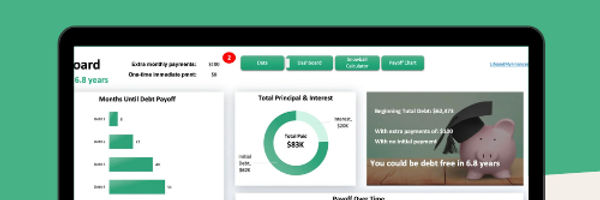
Ready to tackle your student debt? This student debt snowball spreadsheet is what you need!
A few key features of this template:
Proven method tailored to student loans
Customizable to YOUR needs
Works with Excel and Google Sheets
Can handle up to 32 debts!

Top credit cards for a 710 credit score
There are great credit cards for those with good credit scores—
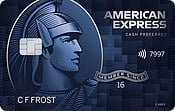 Blue Cash Preferred® Card from American Express 4.6 | 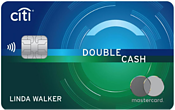 Citi® Double Cash Card - 18 month BT offer 4.6 | 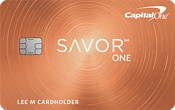 Capital One SavorOne Cash Rewards Credit Card 4.6 |
Annual Fee $95 $0 intro annual fee for the first year, then $95. | Annual fee $0 | Annual fee $0 |
Rewards 1%–6% 6% cashback on supermarket purchases, 3% on gas, and 1% on everything else. | Rewards Rate 2% | Rewards 1%–10% Earn 10% cashback on Uber and Uber Eats, 8% on Capital One Entertainment purchases, 5% on hotels and rental cars, 3% on dining and grocery stores. |
Intro offer Earn a $250 statement credit Earn a $250 statement credit after you spend $3,000 in purchases on your new Card within the first 6 months. | Intro Offer N/A | Intro offer $200 Earn a one-time $200 cash bonus after you spend $500 on purchases in the first 3 months. |
Learn more | Learn more |
Read more:
What are the Benefits of a 710 Credit Score?
Here are some of the primary benefits of having a 710 credit score:
Better approval chances
A 710 credit score increases your likelihood of being approved for various types of loans (e.g., personal, auto, mortgage) and credit cards compared to those with lower scores.
Competitive interest rates
Lenders regard borrowers with a good credit score as lower risk, so you are likely to receive more competitive interest rates on loans and credit cards, helping you save money in the long run.
Strong negotiating power
A good credit score grants you leverage when negotiating loan terms and credit card interest rates. Use your 710 credit score to either push for better deals or find the most competitive offers among different lenders.
Access to premium rewards and perks
Credit cards designed for individuals with good credit often come with added advantages, such as cashback, travel rewards, and sign-up bonuses. A 710 credit score enhances your chances of qualifying for credit cards that provide these benefits.
Favorable rental and utility terms
Landlords have more confidence in your ability to punctually pay rent when you have a good credit score. Additionally, utility companies may waive security deposits or setup fees due to your responsible credit history.
Better insurance rates
Some insurance providers take credit scores into account when determining insurance premiums, particularly for auto and home insurance. A good credit score can lead to lower premiums, saving you money.
What Affects Your Credit Score
Understanding the factors that influence your credit score is crucial to maintaining and improving it. Here are the key elements that affect your credit score:
Source: How To Increase Your Credit Score Quickly
Payment history (35%): Your track record of making timely payments on credit cards, loans, and other bills heavily impacts your credit score. Late or missed payments can negatively affect your score, so it’s essential to stay consistent with your payment obligations.
Credit utilization (30%): This refers to the percentage of your available credit that you’re currently using. Maintaining a low credit utilization rate (ideally below 30%) demonstrates responsible use of credit and positively impacts your credit score.
Length of credit history (15%): The duration of your credit history, including your oldest and newest accounts, as well as the average age of all your accounts, plays a role in your overall credit score. A lengthier credit history generally results in a higher score, as it provides more data for creditors to assess your risk level.
Credit mix (10%): Having a diverse mix of credit types, such as credit cards, mortgages, auto loans, and personal loans, can positively influence your credit score. Lenders like to see that you can manage multiple types of credit responsibly.
New credit (10%): Frequently opening new credit accounts or applying for credit in a short period might indicate a higher risk to lenders, affecting your credit score negatively. Limit the number of new accounts you open and avoid applying for several loans or credit cards within a short time frame.
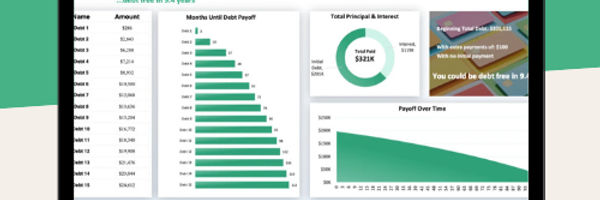
Lay out your credit card debt with the minimum payments and interest to see how long it will take to pay off!
What you will get:
Interactive dashboard
Customizable to your needs
Stay on track with charts and graphs
Suitable for up to 16 or 32 debts!

How to Improve Your 710 Credit Score
Improving and maintaining a good credit score is crucial for securing favorable loan terms and interest rates. Here are some effective strategies to boost your credit score:
Use apps: Utilize credit monitoring and budgeting apps to track your credit score, manage expenses, and ensure timely bill payments.
Make timely payments: Consistently paying your bills on time has a strong positive impact on your credit score.
Keep your credit report clean and accurate: Regularly review your credit report for errors and discrepancies; report any inaccuracies to the credit bureaus for correction.
Get a credit card and use it responsibly: Obtain a credit card, manage it wisely, and maintain low credit utilization to improve your credit score.
Keep your old accounts open: Retaining older accounts helps lengthen your credit history, which can boost your score over time.
Avoid applying for multiple credit lines simultaneously: This can signal riskiness to lenders, potentially hurting your credit score.
Don’t close multiple accounts at once: Abruptly shutting down accounts can negatively affect your credit utilization and overall credit history.
Consider a secured credit card: Secured credit cards, backed by a cash deposit, are a viable option for those aiming to build credit and demonstrate responsible borrowing habits.
Become an authorized user: Joining a trusted family member’s or friend’s credit account as an authorized user can speed up credit-building while also benefiting from their positive credit behavior.
Pay off outstanding debts: Reducing and eliminating debt not only improves your credit utilization but also benefits your overall financial health.
Take out a small loan: Obtaining and responsibly managing a small loan demonstrates your creditworthiness and can strengthen your credit profile.
Limit large purchases: Avoid making excessive large purchases that rapidly increase your credit utilization, as this can negatively impact your score.
Request a credit limit increase: A higher credit limit might lower your credit utilization ratio, potentially improving your score.
Set up payment plans for outstanding collections: Negotiating payment plans for overdue accounts or collections can help mitigate their negative impact on your credit score.
Report rent and utility payments: Request your landlord or utility providers to report your on-time payments to credit bureaus, contributing to a healthy credit history.
Maintain financial stability: Cultivate healthy financial habits and make well-considered decisions to foster long-term credit score improvement.

Lay out your credit card debt with the minimum payments and interest to see how long it will take to pay off!
What you will get:
Interactive dashboard
Customizable to your needs
Stay on track with charts and graphs
Suitable for up to 16 or 32 debts!

Key Takeaways
A 710 credit score is in the “good” range.
Having this score, you can get loans, credit cards, and mortgages, but your interest rates and terms won’t be ideal.
You could improve your credit score to get better terms.
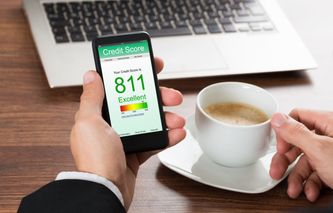
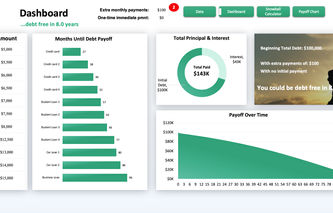
.jpg)



